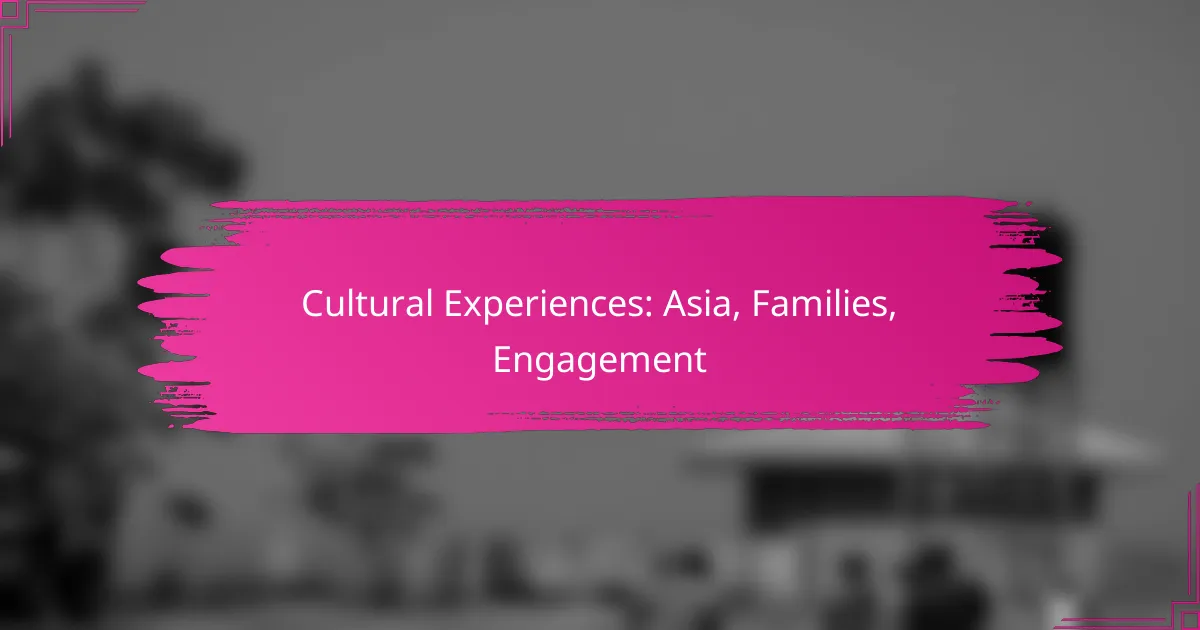Engaging cultural experiences for families in Asia offer a unique opportunity to explore local traditions through interactive activities. From hands-on workshops to vibrant festivals, these experiences are designed to be both educational and entertaining, catering to various interests and age groups. By participating in these cultural engagements, families can strengthen their bonds while gaining a deeper appreciation for diverse perspectives and traditions.
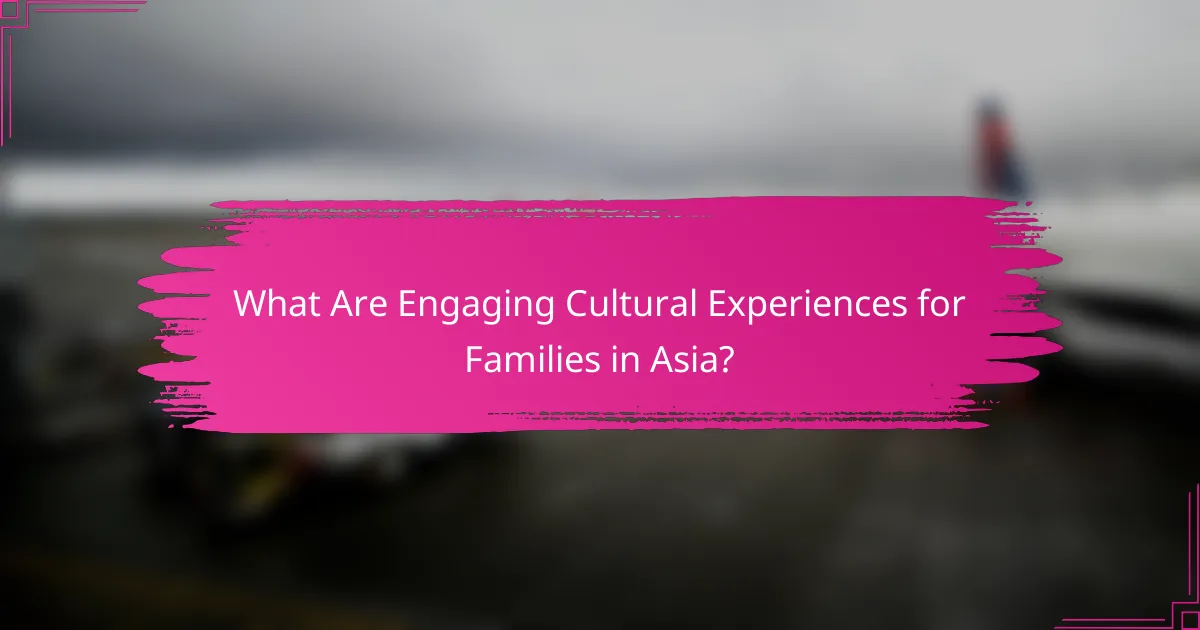
What Are Engaging Cultural Experiences for Families in Asia?
Engaging cultural experiences for families in Asia encompass a variety of interactive activities that allow families to immerse themselves in local traditions and customs. These experiences can range from hands-on workshops to vibrant festivals, providing both educational and entertaining opportunities for all ages.
Interactive workshops in Japan
Interactive workshops in Japan offer families a chance to learn traditional crafts such as origami, calligraphy, or pottery. Many workshops are designed for all skill levels, making them accessible for children and adults alike. Look for sessions that include English-speaking instructors to enhance understanding.
Popular locations for these workshops include Kyoto and Tokyo, where you can find studios that cater specifically to tourists. Booking in advance is recommended, especially during peak tourist seasons.
Traditional festivals in India
Traditional festivals in India, such as Diwali or Holi, provide families with vibrant cultural experiences filled with music, dance, and colorful celebrations. Participating in these festivals allows families to engage with local customs and enjoy unique culinary delights.
Families should consider timing their visit to coincide with these festivals for an unforgettable experience. Be prepared for large crowds and consider safety measures, especially for younger children.
Cultural tours in Thailand
Cultural tours in Thailand can include visits to ancient temples, local markets, and traditional villages, offering families insights into the rich history and culture of the region. Many tours are guided, providing educational context that enhances the experience.
When selecting a tour, look for family-friendly options that include activities suitable for children, such as elephant sanctuaries or cooking demonstrations. Always check for ethical practices regarding animal interactions.
Cooking classes in Vietnam
Cooking classes in Vietnam allow families to learn how to prepare traditional dishes like pho or spring rolls. These classes often include a market tour where participants can select fresh ingredients, making it a comprehensive culinary experience.
Classes are available in major cities like Ho Chi Minh City and Hanoi, and they typically cater to all ages. Families should inquire about class sizes and age restrictions to ensure a suitable environment for children.
Art and craft sessions in Bali
Art and craft sessions in Bali provide families with the opportunity to create traditional Balinese artworks, such as batik or wood carving. These sessions are often led by local artisans who share their techniques and cultural significance behind the crafts.
Look for workshops that accommodate families and offer materials included in the price. Engaging in these creative activities not only fosters family bonding but also supports local artists.
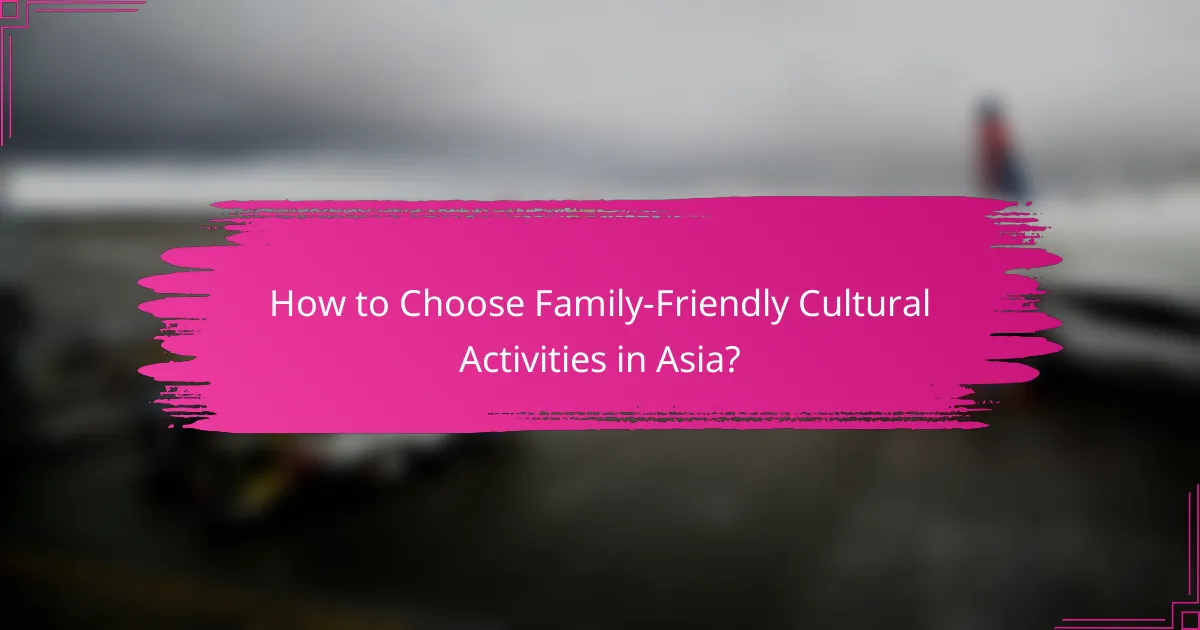
How to Choose Family-Friendly Cultural Activities in Asia?
Selecting family-friendly cultural activities in Asia involves considering the interests and ages of your children while ensuring the experiences are engaging and safe. Focus on activities that promote interaction and learning, making the most of your family’s time together.
Consider age appropriateness
When choosing cultural activities, assess whether they are suitable for your children’s ages. Younger children may prefer interactive exhibits or storytelling sessions, while older kids might enjoy historical sites or workshops. Look for activities that cater to a range of ages to keep everyone engaged.
For example, museums often have special programs for children, such as scavenger hunts or hands-on displays. Check the venue’s website or contact them directly to find age-specific recommendations.
Look for hands-on experiences
Hands-on experiences can significantly enhance cultural learning for families. Activities like cooking classes, craft workshops, or traditional dance lessons allow children to actively participate and connect with the culture. These experiences are often more memorable than passive observation.
Consider local markets or festivals where families can engage in traditional crafts or cooking. These settings not only provide fun but also foster a deeper appreciation for the local culture.
Research local guides and reviews
Utilizing local guides and reading reviews can help you identify the best family-friendly cultural activities. Look for guides who specialize in family tours, as they often tailor experiences to suit children’s interests and energy levels. Online platforms like TripAdvisor or local tourism websites can provide valuable insights.
Pay attention to reviews from other families, focusing on comments about safety, engagement, and overall enjoyment. This can help you avoid activities that may not be suitable for your family.
Check accessibility and safety
Before committing to cultural activities, ensure they are accessible and safe for your family. Consider factors like transportation options, physical accessibility for strollers or wheelchairs, and the general safety of the area. Some sites may have restrictions or require advance booking.
Additionally, check for safety measures in place, such as crowd control at popular attractions or health protocols. This will help you choose activities that provide a secure environment for your family to enjoy.
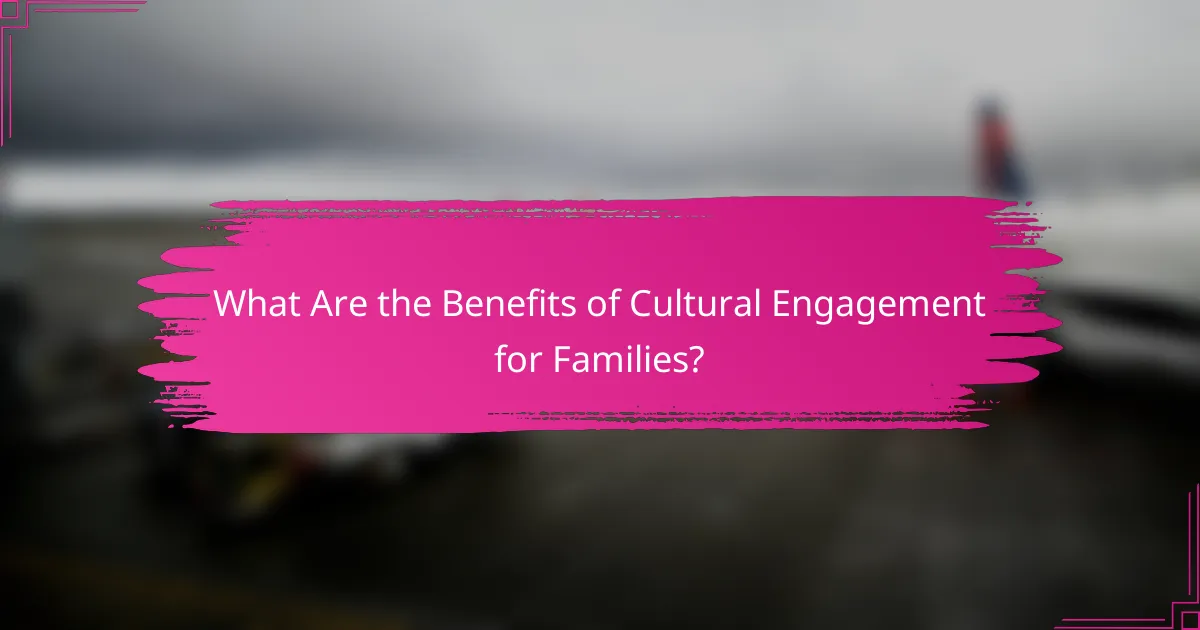
What Are the Benefits of Cultural Engagement for Families?
Cultural engagement offers families numerous benefits, including strengthened relationships, enhanced understanding of diverse perspectives, and increased curiosity about the world. By participating in cultural activities, families can create lasting memories while fostering a sense of belonging and appreciation for different traditions.
Enhances family bonding
Engaging in cultural experiences together can significantly enhance family bonding. Activities such as attending festivals, cooking traditional meals, or visiting museums provide opportunities for shared experiences that strengthen relationships. Families can create traditions around these activities, making them a regular part of their lives.
For example, dedicating one weekend a month to explore different cultural neighborhoods or cuisines can become a cherished family ritual. This not only fosters connection but also builds a shared history that family members can reflect on together.
Promotes cultural awareness
Cultural engagement promotes awareness and appreciation of different cultures, which is essential in today’s globalized world. Families that actively participate in cultural events or discussions are more likely to understand and respect diversity. This awareness can help children develop empathy and reduce biases.
Consider visiting cultural centers or participating in community events that celebrate various heritages. These experiences can open up conversations about differences and similarities, enriching family discussions and broadening perspectives.
Encourages learning and curiosity
Participating in cultural activities encourages learning and curiosity among family members. Exposure to new ideas, languages, and practices can spark interest in exploring further, whether through travel, reading, or engaging with local communities. This ongoing curiosity can lead to lifelong learning.
To cultivate this curiosity, families can set goals such as learning a new language together or exploring a different culture each month. This approach not only makes learning fun but also reinforces the value of education and exploration within the family unit.
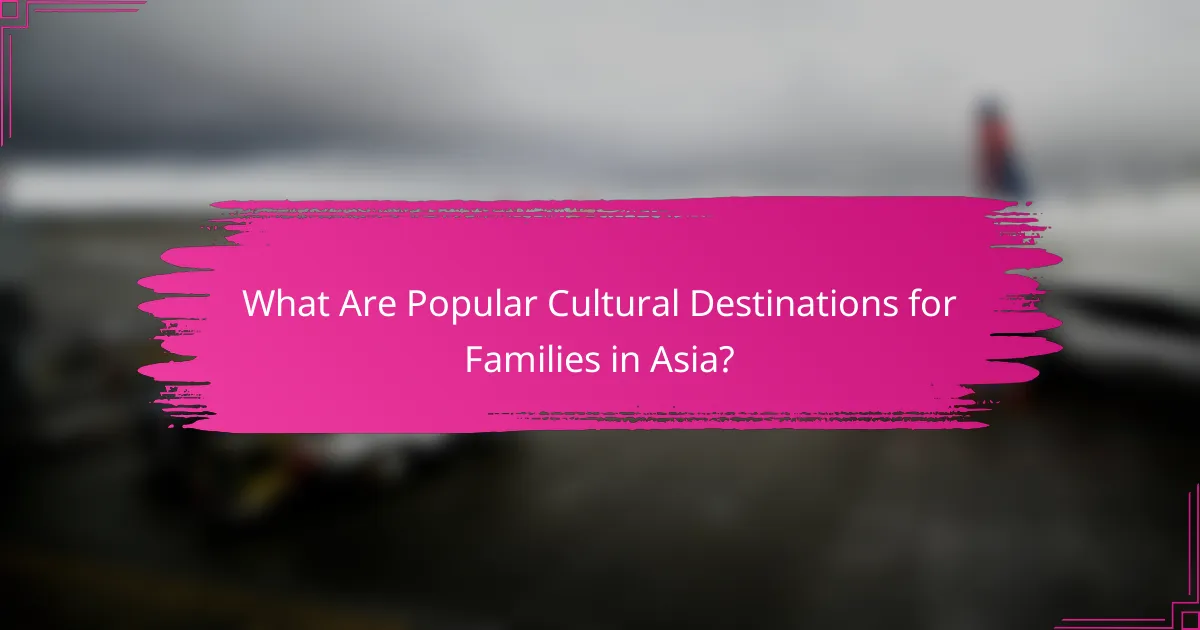
What Are Popular Cultural Destinations for Families in Asia?
Families looking for cultural experiences in Asia can explore vibrant cities rich in history, art, and traditions. Destinations like Tokyo, Bangkok, New Delhi, and Bali offer unique attractions that engage both children and adults alike.
Tokyo, Japan
Tokyo is a bustling metropolis that blends tradition with modernity, making it an exciting destination for families. Key attractions include the historic Senso-ji Temple, interactive museums like the National Museum of Nature and Science, and the whimsical Ghibli Museum.
Families should consider purchasing a Tokyo Family Pass, which offers discounts on public transport and entry to various attractions. Engaging in local customs, such as participating in a tea ceremony, can provide deeper cultural insights.
Bangkok, Thailand
Bangkok is a vibrant city known for its rich cultural heritage and family-friendly activities. The Grand Palace and Wat Pho are must-see landmarks, while the city’s floating markets offer a unique shopping experience.
Families can enjoy a boat tour along the Chao Phraya River, which provides a scenic view of the city’s historical sites. It’s advisable to try local street food, but ensure it is from reputable vendors to avoid any health issues.
New Delhi, India
New Delhi presents a fascinating mix of history and culture, making it an ideal destination for families. Key sites include the Red Fort, India Gate, and the National Museum, which showcases India’s diverse heritage.
Visiting during the cooler months, from October to March, is recommended for a more comfortable experience. Families should also consider guided tours to navigate the city’s rich history and avoid common tourist pitfalls.
Bali, Indonesia
Bali is renowned for its stunning landscapes and vibrant culture, offering families a range of activities. Cultural experiences such as traditional Balinese dance performances and visits to ancient temples like Uluwatu are highlights.
Families can also enjoy outdoor activities like rice terrace trekking and snorkeling in clear waters. Staying in family-friendly resorts that offer cultural workshops can enhance the experience and provide a deeper understanding of Balinese traditions.
